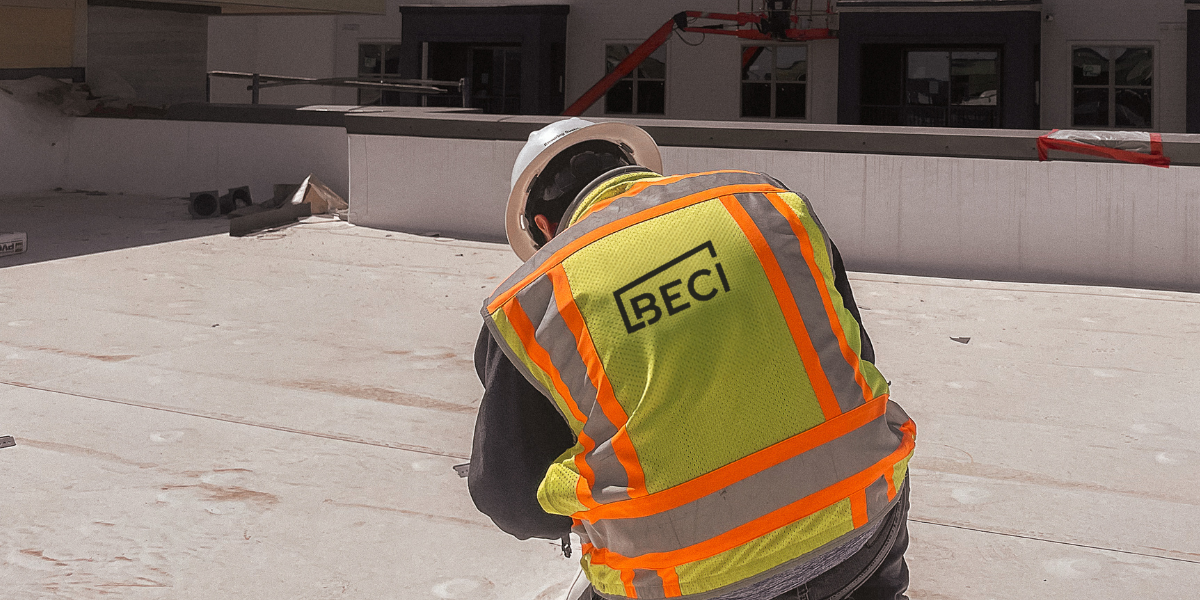What is Building Enclosure Consulting?
Typical building enclosure consulting is consulting services to improve building airtightness and waterproofing. Experts provide analysis and solutions to issues midway through the construction process or after a building is already constructed. In new construction projects, testing happens post hoc, and contractors must backtrack and redo past work to fix issues. In existing construction, the services help manage decay and outline plans for repairs.
What is BECx, and how does it differ from Building Enclosure Consulting?
BECx stands for Building Enclosure Commissioning (or Building Envelope Commissioning), a means of early oversight and testing for construction projects. With BECx, experts provide supervision and feedback as the building is being designed. This is much earlier than traditional building enclosure consulting. BECx is a much more proactive approach and can help avoid extensive reworking expenses for design and physical alterations.
BECx not only includes assistance in developing the project design, but it also includes functional performance testing during the construction process. This testing is more holistic in nature, and is scheduled and performed earlier in the process.
Testing helps identify functional deficiencies before ownership accepts a building. It also provides documentation that validates that the general contractor and trade contractors have resolved all items before building turnover to better protect them from superfluous warranty calls, providing benefits and protections for both owners and contractors.
Furthermore, the design involvement on the front end provides some reduced liability for the architect as there are more checks and balances to avoid poor designs that could lead to errors and omissions or incomplete design claims.
What does BECx help improve?
BECx typically helps improve energy efficiency and has the potential to create a more environmentally friendly norm throughout the construction industry if more universally applied.
“BECx is intended to increase the likelihood that completed construction meets the owner’s requirements through review of the air barrier design and installation.”
Building Innovation Hub

What are some hesitancies building owners have about BECx?
While BECx, in theory, sounds ideal, building owners are often hesitant to take on the additional expense of this service. Ideally, future savings offset the added cost of commissioning, but there are essential steps to ensure the added fees produce cost-saving results.
1) Early Access
Building enclosure consultants often join a project at later stages. Unfortunately, when building owners consider BECx, they may be too late to capitalize on the benefits. The later BECx experts begin oversight, the less they can mitigate possible issues that are expensive to fix.
Starting BECx too late can result in inadequate ROI for the services, and it’s paramount to consider this when choosing whether or not to add this service.
2) Full Team Involvement
Most architects and contractors are used to a quick pace and have a lot of autonomy in their decisions. Contractors, specifically, are often placed under a lot of pressure to meet quick and unrealistic construction deadlines. They are required to make decisions outside of their areas of expertise. This norm can lead to many inefficiencies since they don’t have the background in detailed testing.
Adding an external expert performing BECx can complicate construction leadership’s dynamic. Many contractors are not used to the oversight BECx experts provide, and changing and slowing down their processes can be difficult.
Proper BECx requires full team buy-in and cooperation. If contractors work outside the BECx consultant’s guidelines or leave the consultant out of communication, the building owner receives fewer financial and efficiency benefits from BECx services.

Costs of Building without BECx
While BECx is far from being used universally, and there are hindrances to its efficacy, the cost of not including the valuable service can be extensive.
There are many normalized areas of inefficiency both in construction productivity and quality.
1) Re-works
BECx provides engineering oversight at the very beginning of a construction project. It is extensive, and managers can expect to avoid costly reworks if they include BECx in their process.
2) Air and Water Inefficiencies
Most buildings in the US have extensive inefficiencies when it comes to air and water intrusion. This can include: a higher cost to heat and cool the building, water damage, mold growth, and many other costly issues. Thoroughly testing building materials throughout the building process with BECx can cut back on these issues.
3) Forensic Investigation & Litigation
BECx is an excellent tool for risk management and can protect building owners from liability and extensive forensic investigation costs. Expert surveillance not only catches more issues, so lawsuits are much less likely, but it also provides more comprehensive documentation for added proof and protection in case one does occur.
Final Thoughts
BECx is a valuable service that has the potential to provide extensive cost savings for building owners. There are limitations that all building owners should take into consideration before starting the process. However, in a good environment, the benefits can be extensive monetarily.
It’s understood in all construction areas that early involvement is a huge benefit and opportunity for cost savings. The sooner you engage the experts, the less likely you are to create a poor design, blow a budget, or surpass a schedule duration. This phenomenon is already generally accepted for general contractors and subcontractors. So why not engage a consultant earlier through the BECx process? If the BECx process is done well, it should provide savings and help avoid reworks, wasted time, unnecessary expenses, and overall headaches for building owners.





